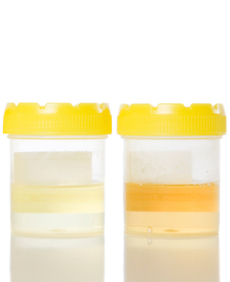Urine Test Predicts Bladder Cancer Recurrence
A noninvasive DNA methylation test using urine samples from patients with non–muscle-invasive bladder cancer can detect cancer recurrence. The test demonstrated both specificity and sensitivity in detecting recurrence.
A noninvasive DNA methylation test using urine samples from patients with non–muscle-invasive bladder cancer can detect cancer recurrence.

A noninvasive DNA methylation test using urine samples from patients with non–muscle-invasive bladder cancer can detect cancer recurrence. The test demonstrated both specificity and sensitivity in detecting recurrence.
The results of the National Cancer Institute–funded study were published in Clinical Cancer Research, a journal from the American Association for Cancer Research (AACR). The test measures three separate DNA methylation markers-an epigenetic modification that adds a methyl group to either a cytosine or adenine DNA nucleotide-from urine samples of patients with bladder cancer. DNA methylation is used by cells to either activate (loss of DNA methylation) or silence (gain of DNA methylation) specific genes.
The test was able to predict tumor recurrence in 80% of the validation patient cohort, whose recurrence was confirmed with standard cytology, cystoscopy, and clinical monitoring. Using cytology, only 35% of recurrences were detected. Cystoscopy could detect 15% of recurrences. The specificity of the test was 97%.
The results were reproducible with a second sample set.
“Urinary cytology is hampered by low sensitivity-not all patients with recurrence are detected-and cystoscopic examinations are invasive for the patient,” said senior author of the study Gangning Liang, PhD, of the department of urology at USC Norris Comprehensive Cancer Center in Los Angeles.
Non–muscle-invasive bladder cancer accounts for approximately 80% of all bladder cancers and has a high rate of recurrence, even after resection of the bladder tumor, requiring lifelong monitoring. Liang and colleagues reasoned that because DNA methylation changes can occur early in the course of tumor progression and because these are chemically stable changes, even in fluid samples, this process can be quantified in the bladder tumor cells shed into the urine of patients.
The team collected 368 urine sediment samples over the course of 7 years from 90 patients with noninvasive urothelial carcinoma who were being monitored for recurrence. The researchers analyzed six potential methylation markers from the samples. These sites were previously observed to change in DNA methylation status in bladder cancer tumor samples. Using statistical methods, the combination of three markers was found to be the most accurate, exhibiting the highest sensitivity and specificity.
Fifty-six of the patients had no recurrence and 34 recurred. Positive DNA methylation scores were found for 34 of the 38 (89%) patients at the time of a recurrence diagnosis compared with the sensitivity of a cytology test (16%) and cystoscopy (8%). Eight percent of the patients who tested positive for recurrence by the urine test developed recurrence later. Of the 70 patients who had a negative urine test, 52 (74%) had no recurrence.
“By using a panel of three DNA methylation markers, we can predict or diagnose the recurrence of bladder cancer with superior sensitivity and specificity in patients’ urine and thus avoid unnecessary and invasive medical exams and procedures,” said Liang. “Based on our results, using DNA methylation marker tests, we can detect recurrence earlier than by clinical diagnoses such as cytology and invasive cystoscopy.”
The three markers are sites in the SOX1 gene, which codes for L1-MET within the MET oncogene that activates an alternative transcript of the MET gene and a key epigenetic driver gene interleukin-1 receptor-associated kinase 3 (IRAK3).
The researchers are currently working to decrease the false negative rate of the test by looking for other markers to boost both specificity and sensitivity. “The approach we took to develop the test is sufficiently general, so that with the addition of new markers it could be possible to further increase specificity. This depends on the biology, which we are still studying,” said Liang.
Clinical trials to test the performance of this DNA methylation marker panel are needed before it could be used in the clinic to detect bladder cancer recurrence in patients.